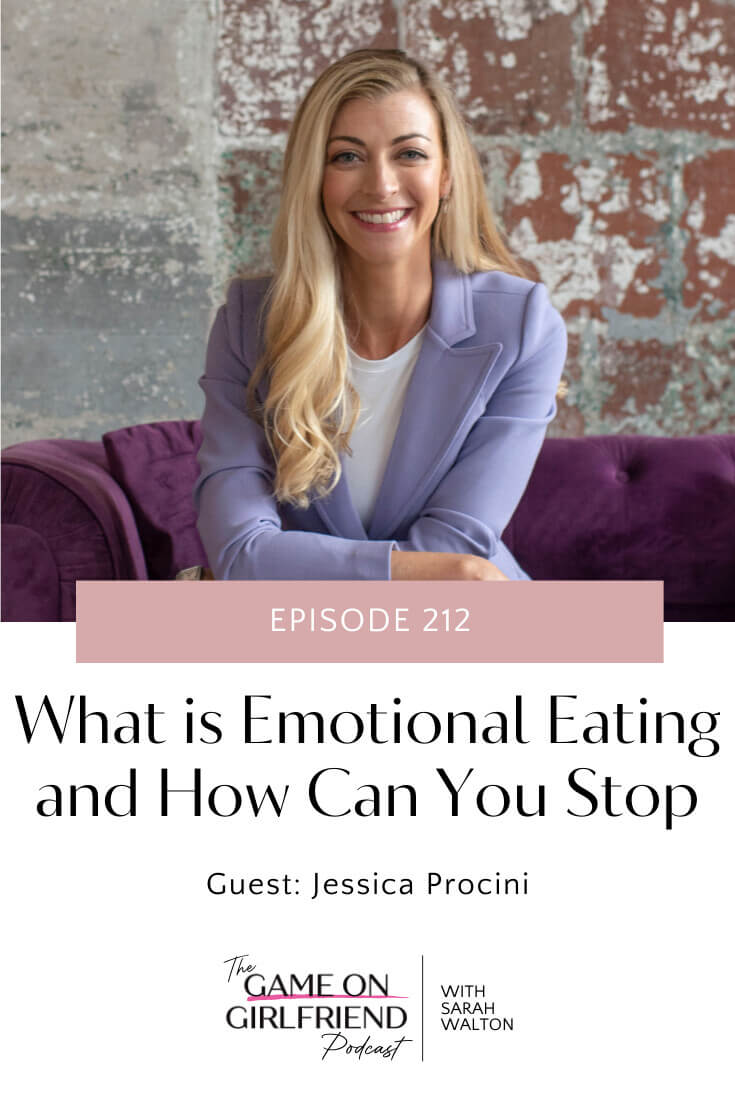Episode 212: What is Emotional Eating and How Can You Stop With Jessica Procini

As an emotional eating expert, Jessica Procini has made it her mission to give you permission to stop and listen to the parts of you that might be asking for a little bit of help. For those of us that are so high functioning, who we think we don't need anything, but that might actually be at the heart of emotional eating.
Since 2011, Jessica, the founder and leader of Escape from Emotional Eating, has been helping women heal the roots of their emotional eating so they can embody their full potential. After years of mismatched programs and therapy, Jessica knew that she couldn't work with just anyone. She wanted real change, where she could truly break free from her cynical, chaotic patterns with food and her body.
Journey to overcome emotional eating
Jessica created Escape from Emotional Eating, a unique process grounded in decades of research, a background in the psychology of eating, transformational coaching methods, and her own personal emotional eating journey so her clients can learn to use food as a nourishing asset rather than a self-destructive way to cope.
She had already gone through nutrition school and had health and wellness expertise under her belt when she found out that she was an emotional eater. It blew her mind that she still couldn't manage when it came to food. She knew there were other people who knew so much about health and wellness but really felt powerless at certain points in their relationship with food and their bodies.
There is a difference between just intellectually knowing information and motivating us to take action to create change.
“To really change, especially when it comes to our health or our body or our emotional health or our mental health, we have to embody it,” says Jessica. “It has to be in our bones. It has to be in ourselves, and we have to be moving it into action to actually, really, truly know what makes us healthy and what ultimately poisons us.”
For Jessica, it wasn’t a rock bottom or lightning strike moment when she realized she was an emotional eater. She recalls not being at peace with food in her body and noticed it was getting worse. She found herself reaching for food when she felt stressed or life got overwhelming.
Recognizing emotional eating
Jessica says people assume that emotional eating means that you have to eat ten bags of potato chips, you know, to like be an emotional eater. When it comes to emotional eating, it's not about what you're eating and it really has nothing to do with 2 or 20 of something. It's about the why and really honestly answering that question.
What defines emotional eating is actually what's going on behind the scenes with the thoughts in our heads and the emotions that we're feeling. Jessica says from her own experience and that of her clients, they'll say things to themselves like, “Well, I can't do anything about this, so I might as well eat.”
Another thing they might say is, “I look forward to eating. Eating and food is really like the joy in my day, so I might as well eat.” Another example is having this fear when they start to reach a certain point in an eating experience, and they're kind of at that choice point of, do I keep eating or do I stop? And they'll get flooded with this sense? A fear of, “Well, I might not have this again, so let me just finish what's on my plate.” Or, “I will have time to eat when I actually get hungry again. Let me just overeat now.”
One more example is when we feel like “this is all too much.” Life is too much, the day's been too much, there's too much going on. And there is this feeling of “I need to eat something.”
All of these are just some examples of what and the why behind emotional eating. Jessica says we need to be looking at these deeper parts. They're unhealthy coping mechanisms, and what makes something an unhealthy coping mechanism is that it involves self-silencing and powerlessness.
The experience can be very nuanced. If someone is struggling and sits down to dinner with the intention to restore and relax, it can go off the rails when the shift is to use food to force relaxation or similar. That might look like eating dinner so quickly that you’re disconnected from feeling full or satiated.
Rebuild trust with your relationship to food
Jessica shares what she considers a bold statement: There isn’t any reason why anyone should be upset with themselves specifically when it comes to what they’re eating. We are all human. We all are on this planet to learn and experience and everything can be like course corrected. If we're constantly engaging in this cycle of eating something and then beating ourselves up about it; it creates a really toxic internal environment.
Most of all, Jessica says, it ruptures the relationship and the trust that you have in yourself. Self-silencing -- any time you devalue or ignore your own inner needs or thoughts -- is a symptom of losing that trust.
Another way to think of it is as a disconnect or this disassociation from your own inner guidance or inner compass, or intuition. Some of this comes from our upbringing and past traumatic experiences and how we’ve learned to cope with difficult situations.
Some of this is also baked into the patriarchal society where, especially as women, we are taught to defer our needs, hopes, and dreams to serve other people, serve the family, serve the business, and serve society. Eventually what happens is we can't keep running on fumes, so we end up becoming very angry. But then telling ourselves we can't be angry. That's not acceptable. It’s a cycle.
“What I love about emotional eating and the portal that it opens when we're willing to do the real work, is that it puts us back in touch with ourselves from even just the nuances of, ‘well, how do you know when you're hungry?’" says Jessica. “Because especially as women, we've been taught that it's not okay to be hungry. We shouldn't be hungry for food and we shouldn't be hungry for success.”
It’s not only permission to be hungry but also to be then able to honor it and move it into action. We first start the process by reconnecting to ourselves, reconnecting to our bodies, and reconnecting to something that we have to do. We have to eat. So why not use something that we're already doing to create a ripple and a greater healing in our lives, says Jessica.
If you truly want freedom and you truly want to be at peace, no matter how healthy you eat, and no matter how much you exercise, you have to get to the roots of your unhealthy relationship with food.
Self-assessment quiz
You can take Jessica's free quiz to explore four roots of emotional eating and get clarity and strategies to stop emotional eating.
Binge More Game On Girlfriend™ Podcast Episodes
GRAB MY FREE FREEDOM CALCULATOR SO YOU CAN:

Learn the exact number you need to feel FREE!
Know exactly what you need to do each day to make more money.
Make tracking your numbers easy with my revenue tracking tool (the same tool I use every day in my own business!)
Learn the TOP 2 mistakes most business owners make when it comes to tracking revenue
It's time to move from "fingers crossed" to clear and successful.




